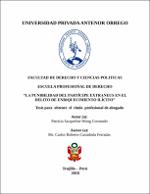La punibilidad del partícipe extraneus en el delito de enriquecimiento ilícito

View/
Download
(application/pdf: 1.463Mb)
(application/pdf: 1.463Mb)
Date
2018Author(s)
Wong Coronado, Patricia Jacqueline
Metadata
Show full item recordAbstract
La presente tesis tiene por finalidad sustentar la punibilidad del partícipe extraneus en el delito de
enriquecimiento ilícito, considerando la incomunicabilidad de circunstancias y cualidades
personales entre autores y partícipes.
El primer capítulo de este trabajo de investigación comprende el problema, hipótesis, objetivos y
justificación de la presente tesis.
El segundo capítulo aborda el marco teórico, que incluye los antecedentes y las bases teóricas; la
misma que consta, a su vez, de seis acápites. El primer acápite comprende temas referentes al delito
como tal. El segundo acápite refiere sobre los sujetos intervinientes en el delito, basándose en las
formas de intervención delictiva, como son la autoría y la participación. Asimismo, se incluyen los
conceptos de extraneus e intraneus. El tercer acápite comprende conceptos relacionados al delito
de enriquecimiento ilícito. El cuarto acápite estudia el Principio de Accesoriedad Delictiva y los
principios que se vinculan a este. El quinto acápite refiere sobre el Principio de Incomunicabilidad
de circunstancias y cualidades entre autores y partícipes de un mismo hecho delictivo. El sexto
acápite se centra en las circunstancias y cualidades personales del autor que afectan o fundamentan
la responsabilidad penal del partícipe extraneus.
El tercer capítulo aborda la metodología seguida en el presente trabajo investigativo.
Finalmente el quinto capítulo comprende las conclusiones arribadas en este estudio, habiéndose
logrado determinar que es posible sustentar la punibilidad del partícipe extraneus en el delito de
enriquecimiento ilícito, teniendo en cuenta la incomunicabilidad de circunstancias y cualidades
personales entre autores y partícipes prevista en el artículo N° 26 del Código Penal, partiendo de
su estudio e interpretación; considerando que este artículo solo comprendería la incomunicabilidad de circunstancias y cualidades que afecten la responsabilidad de autores a partícipes de un mismo
hecho delictivo, es decir, de aquellas que atenúen, agraven o excluyan la responsabilidad penal,
siendo que al no estar inmersas, dentro de este precepto legal, las circunstancias y cualidades que
fundamentan la responsabilidad penal, estas sí podrían ser comunicables de autores a partícipes de
un mismo hecho punible. The purpose of this thesis is to support the punishability of the extraneus participant in the crime
of illicit enrichment, considering the incommunicability of circumstances and personal qualities
between authors and participants.
The first chapter of this research work includes the problem, hypothesis, objectives and justification
of the present thesis.
The second chapter deals with the theoretical framework, which includes the background and the
theoretical bases; the same that consists, in turn, of six sections. The first section includes issues
related to crime as such. The second section refers to the subjects involved in the crime, based on
the forms of criminal intervention, such as authorship and participation. Likewise, the concepts of
extraneus and intraneus are included. The third section includes concepts related to the crime of
illicit enrichment. The fourth section studies the Criminal Accessibility Principle and the principles
that are linked to it. The fifth section refers to the Principle of Incomunicability of circumstances
and qualities between authors and participants in the same criminal act. The sixth section focuses
on the circumstances and personal qualities of the author that affect or support the criminal liability
of the extraneus participant.
The third chapter addresses the methodology followed in the present research work.
Finally, the fifth chapter includes the conclusions arrived at in this study, having been able to
determine that it is possible to sustain the punishability of the extraneus participant in the crime of
illicit enrichment, taking into account the incommunicability of circumstances and personal
qualities between authors and participants provided in article N ° 26 of the Criminal Code, based
on its study and interpretation; Considering that this article would only understand the incommunicability of circumstances and qualities that affect the responsibility of authors to
participate in the same criminal act, that is to say, those that attenuate, aggravate or exclude criminal
responsibility, being that not being immersed, within This legal precept, the circumstances and
qualities that underlie criminal responsibility, these could be communicable from authors to
participants in the same punishable act.
Subject
Collections
- Derecho [481]

